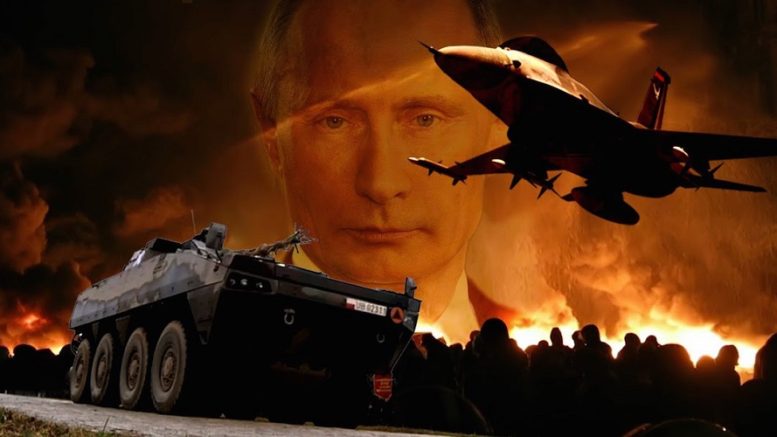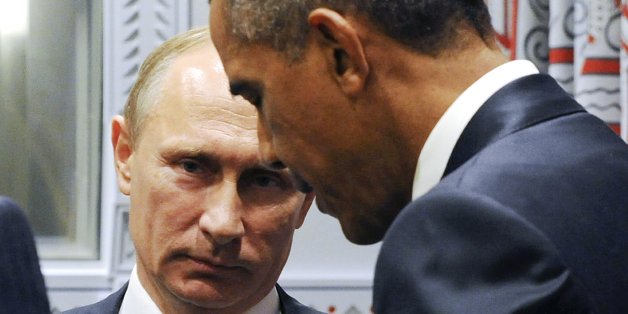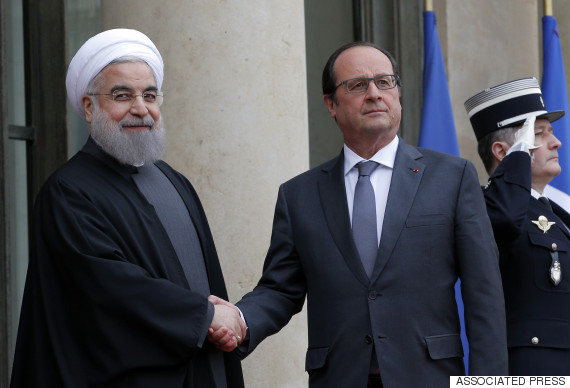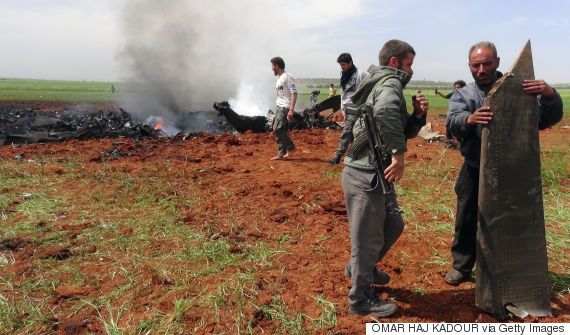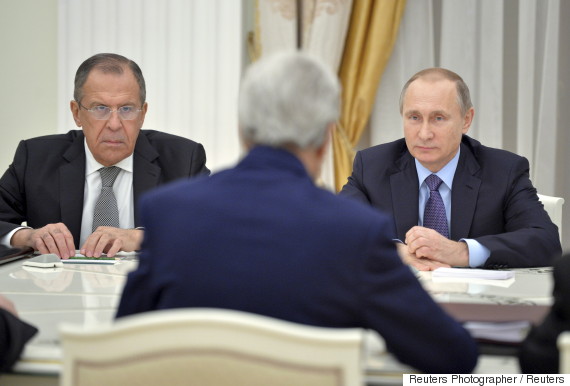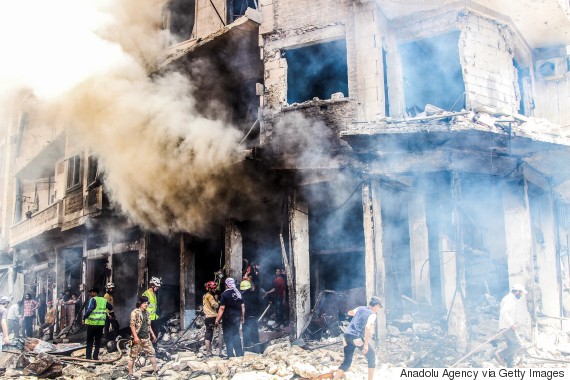The Slow Death of the Syria Cease-Fire Brings a Hybrid War With Russia Closer
Alastair Crooke
BEIRUT — Gradually, the mist of ambiguity and confusion hanging over Syria is lifting a little. The landscape is sharpening into focus. With this improved visibility, we can view a little more clearly the course of action being prepared by Iran, Russia and the Syrian government.
Russia is emerging from an internal debate over whether the U.S. is truly interested in an entente or only in bloodying Russia’s nose. And what do we see? Skepticism. Russia is skeptical that NATO’s new missile shield in Poland and Romania, plus military exercises right up near its border, are purely defensive actions.
Iran, meanwhile, is studying the entrails of the nuclear agreement. As one well-informed commentator put it to me, Iran is “coldly lethal” at the gloating in the U.S. at having “put one over” Iran. Because, while Iran has duly taken actions that preclude it from weaponizing its nuclear program, it will not now gain the financial normalization that it had expected under the agreement.
What do we see? Skepticism.
It’s not a question of slow implementation — I’ve heard directly from banks in Europe that they’ve been visited by U.S. Treasury officials and warned in clear terms that any substantive trade cooperation with Iran is closed off. Iran is not being integrated into the financial system. U.S. sanctions remain in place, the Europeans have been told, and the U.S. will implement fines against those who contravene these sanctions. Financial institutions are fearful, particularly given the size of the fines that have been imposed — almost $9 billion for the French bank BNP a year ago.
In principle, sanctions have been lifted. But in practice, even though its sales of crude are reaching pre-sanctions levels, Iran has found that, financially, it remains substantially hobbled. America apparently achieved a double success: It circumscribed Iran’s nuclear program, and the U.S. Treasury has hollowed out the nuclear agreement’s financial quid pro quo, thus limiting Iran’s potential financial empowerment, which America’s Gulf allies so feared.
Some Iranian leaders feel cheated; some are livid. Others simply opine that the U.S. should never have been trusted in the first place.
And Damascus? It never believed that the recent cease-fire would be a genuine cessation of hostilities, and many ordinary Syrians now concur with their government, seeing it as just another American ruse. They are urging their government to get on with it — to liberate Aleppo. “Just do it” is the message for the Syrian government that I’ve heard on the streets. A sense of the West being deceitful is exacerbated by reports of American, German, French and possibly Belgian special forces establishing themselves in northern Syria.
Some Iranian leaders say that the U.S. should never have been trusted in the first place.
All this infringement of Syrian sovereignty does not really seem temporary but rather the opposite: there are shades of Afghanistan, with all the “temporary” NATO bases. In any case, it is no exaggeration to say that skepticism about Western motives is in the air — especially after Ashton Carter, the U.S. defense secretary, raised the possibility of NATO entering the fray.
As Pat Lang, a former U.S. defense intelligence officer, wrote last week:
The Russians evidently thought they could make an honest deal with [U.S. Secretary of State John] Kerry [and President] Obama. Well, they were wrong. The U.S. supported jihadis associated with [Jabhat al-Nusra, al Qaeda’s Syria wing] … merely ‘pocketed’ the truce as an opportunity to re-fit, re-supply and re-position forces. The U.S. must have been complicit in this ruse. Perhaps the Russians have learned from this experience.
Lang goes on to note that during the “truce,” “the Turks, presumably with the agreement of the U.S., brought 6,000 men north out of [Syria via the] Turkish border … They trucked them around, and brought them through Hatay Province in Turkey to be sent back into Aleppo Province and to the city of Aleppo itself.”Reports in Russian media indicate that Nusra jihadists, who have continued toshell Syrian government forces during the “truce,” are being commanded directly by Turkish military advisers. And meanwhile, the U.S. supplied the opposition with about 3,000 tons of weapons during the cease-fire, according to I.H.S. Jane’s, a security research firm.
In brief, the cease-fire has failed. It was not observed. The U.S. made no real effortto separate the moderates from Nusra around Aleppo (as Russian Foreign Minister Sergei Lavrov has affirmed). Instead, the U.S. reportedly sought Nusra’s exemption from any Russian or Syrian attack. It reminds one of that old joke: “Oh Lord, preserve me from sin — but not just yet!” Or in other words, “preserve us from these dreadful jihadist terrorists, but not just yet, for Nusra is too useful a tool to lose.”
The cease-fire did not hasten any political solution, and Russia’s allies — Iran and Hezbollah — have already paid and will continue to pay a heavy price in terms of casualties for halting their momentum toward Aleppo. The opposition now has renewed vigor — and weapons.
It is hard to see the cease-fire holding value for Moscow much longer. The original Russian intention was to try to compel American cooperation, firstly in the war against jihadism and, more generally, to compel the U.S. and Europe to acknowledge that their own security interests intersect directly with those of Moscow and that this intersection plainly calls for partnership rather than confrontation.
The opposition now has renewed vigor — and weapons.
The present situation in Syria neither facilitates this bigger objective nor the secondary one of defeating radical jihadism. Rather, it has led to calls in Russia for a less conciliatory approach to the U.S. and for the Kremlin to acknowledge that far from preparing for partnership, NATO is gearing up for a hybrid war against Russia.
It is also hard to see the cease-fire holding any continuing value for Tehran either. While the Iran nuclear agreement seemed to hold out the promise of bringing Iran back into the global financial system, such expectations seem now to be withering on the vine. As a result, Iran is likely to feel released from self-imposed limitations of their engagement in Syria and in other parts of the Middle East. Damascus, meanwhile, only very reluctantly agreed to leave its citizens in Aleppo in some semi-frozen limbo. Iran and Hezbollah were equally dubious.
All this suggests renewed military escalation this summer. Russian President Vladimir Putin will probably not wish to act before the European summit at the end of June. And neither would he wish Russia to figure largely as an issue in the U.S. presidential election. Yet he cannot ignore the pressures from those within Russia who insist that America is planning a hybrid war for which Russia is unprepared.
The Russia commentator Eric Zuesse encapsulated some of these concerns,writing that “actions speak louder than words.” Earlier this month, he notes, the U.S. refused to discuss with Russia its missile defense program:
Russia’s concern is that, if the ‘Ballistic Missile Defense’ or ‘Anti Ballistic Missile’ system, that the U.S. is now just starting to install on and near Russia’s borders, works, then the U.S. will be able to launch a surprise nuclear attack against Russia, and this system, which has been in development for decades and is technically called the ‘Aegis Ashore Missile Defense System,’ will annihilate the missiles that Russia launches in retaliation, which will then leave the Russian population with no retaliation at all.
Zuesse goes on to argue that the U.S. seems to be pursuing a new nuclear strategy, one that was put forward in 2006 in a Foreign Affairs article headlined “The Rise of Nuclear Primacy,” and scrapping the earlier policy of “mutually assured destruction.” The new strategy, Zuesse writes, argues “for a much bolder U.S. strategic policy against Russia, based upon what it argued was America’s technological superiority against Russia’s weaponry — and a possibly limited time-window in which to take advantage of it — before Russia catches up and the opportunity to do so is gone.”
So, what is going on here? Does the U.S. administration not see that pulling Russia into a debilitating Syrian quagmire by playing clever with a cease-fire that allows the insurgency to get the wind back in its sails is almost certain to lead to Russia and Iran increasing their military engagement? There is talk both in Russia and Iran of the need for a military surge to try to break the back of the conflict. Does the U.S. see that ultimately such a strategy might further entangle it — just as much as Russia and Iran — in the conflict? Does it understand Saudi Arabia’sintent to double down in Syria and Turkish President Recep Tayyip Erdogan’s political interest in continuing the Syrian crisis? Does it judge these very real dangers accurately?
No, I think not: the political calculus is different. More likely, the explanation relates to the presidential election campaign in the U.S. The Democratic Party, in brief, is striving to steal the Republican Party’s clothes. The latter holds the mantle of being credited as the safer pair of hands of the two, as far as America’s security is concerned. This has been a longstanding potential weakness for the Democrats, only too readily exploited by its electoral opponents. Now, perhaps the opportunity is there to steal this mantle from the Republicans.
The Democratic Party is striving to steal the Republican Party’s clothes.
All this hawkishness — the American shrug of the shoulders at making Iran feel cheated over the nuclear agreement; at Russia, Iran and Damascus seething that the Syria cease-fire was no more than a clever trap to halt their military momentum; at the psychological impact of NATO exercising on Russia’s borders; at the possible consequences to Obama’s refusal to discuss the ballistic defense system — all this is more likely about showing Democrat toughness and savvy in contrast to Donald Trump.
In short, the Democrats see the opportunity to cast themselves as tough and reliable and to transform foreign policy into an asset rather than their Achilles’ heel.
But if all this bullheadedness is nothing more than the Democratic Party espying an apparent weakness in the Trump campaign, is this foreign policy posturing meaningful? The answer is that it is not meaningless; it carries grave risks. Ostensibly this posture may appear clever in a domestic campaigning context, where Russia is widely viewed in a negative light. But externally, if the Syrian cease-fire comes to be viewed as nothing more than a cynical ploy by the U.S. to drag Russia deeper into the Syrian quagmire in order to cut Putin down to size, then what will likely follow is escalation. Hot months ahead in Syria. Russia will gradually reenter the conflict, and Iran and Iraq will likely increase their involvement as well.
There are those in the U.S., Turkey and the Gulf who would welcome such a heightened crisis, hoping that it would become so compellingly serious that no incoming U.S. president, of either hue, could avoid the call to do something upon taking office. In this way, the U.S. could find itself dragged into the maw of another unwinnable Middle Eastern war.
We should try to understand the wider dangers better, too. Baiting Russia, under the problematic rubric of countering Russian “aggression,” is very much in fashion now. But in Russia, there is an influential and substantial faction that has come to believe that the West is planning a devastating hybrid military and economic war against it. If this is not so, why is the West so intent on pushing Russia tight up into a corner? Simply to teach it deference? Psychologists warn us against such strategies, and Russia finally is reconfiguring its army (and more hesitantly, its economy) precisely to fight for its corner.
The U.S. could find itself dragged into the maw of another unwinnable Middle Eastern war.
As another noted Russia commentator, John Helmer, noted on his blog on May 30, the new NATO missile installations in Eastern Europe “are hostile acts, just short of casus belli — a cause of war.” According to Reuters, Putin warned that Romania might soon “be in the cross hairs” — the new NATO missile installations there will force Russia “to carry out certain measures to ensure our security.”
“It will be the same case with Poland,” Putin added.
Did you hear that sound? That was the ratchet of war, which has just clicked up a slot or two.
___
http://www.huffingtonpost.com/alastair-crooke/syria-cease-fire-russia_b_10510126.html
